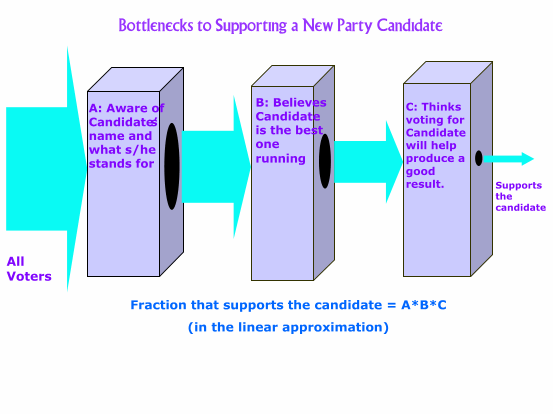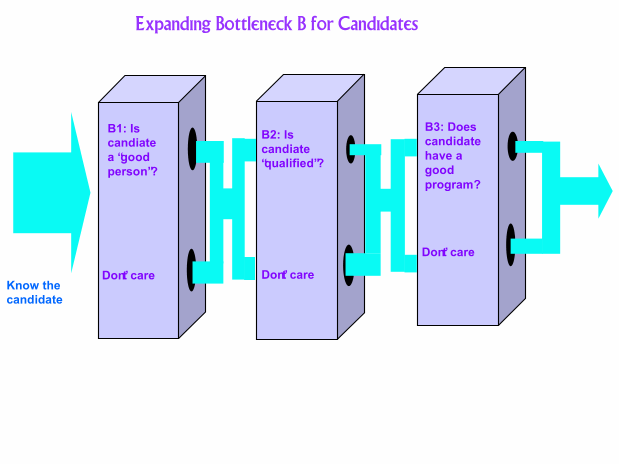Bottleneck Analysis Applied to Candidates
So far, I have centered my analysis on parties vs. specific candidates. When we look at specific candidates, the bottleneck diagram looks rather similar at first:
�
However, the second bottleneck is about more than just ideology. Other factors go into determining who is the Best Candidate.
�
Bottleneck B is actually a series of three sub-bottlenecks. However, the candidate does not have to pass all three bottlenecks for every particular voter. Different voters look at different aspects of a candidate. Some people look for the “best person” and rely on that person’s judgment. Other’s focus on the candidate’s resume: experience and accomplishments in life. Finally, we have the ideologues (like most of you reading this document) who focus on the ideas that the candidate intends to put into action. Some people look at a combination of two or three of these factors.
Bottlenecks B1 and B2 are especially important for an executive office. Executives have more individual power and flexibility, more opportunities to do bad things due to either corruption or incompetence. Legislators, on the other hand, are elected more for the ideals they represent. One legislator’s lack of experience in a particular domain can be made up for by another legislator’s experience. And it takes a large group of legislators acting cooperatively to be really corrupt.
That said, a candidate who is really bad by any of these metrics will lose votes even from those who generally focus on the metric where the candidate is strong.
It is well worth noting that the first two sub-bottlenecks are of extreme importance when it comes to the office of President of the United States. The President is CEO of the U.S. bureaucracy and Commander in Chief of the armed forces first, and that guy with a veto pen who suggests legislation to Congress second.
Third parties usually overlook this when choosing their presidential contender, and hurt their credibility accordingly. CEO of the U.S. is not an entry level position. Lawyer, engineer, computer programmer or even congressman are insufficient qualifications for the job. To be taken seriously by those who take the office seriously, the candidate should have proven experience running a large organization. The candidate should have been governor, mayor of a large city, CEO of a big corporation, or general. Prior military experience is also very helpful even if low level (for non-generals).
H. Ross Perot was taken seriously as a presidential contender for reasons beyond having a large campaign war chest. He had experience building and running a large organization. He had credit for his activism on behalf of MIAs and even had launched a paramilitary operation to get his employees out of Iran. Perot was considered the best candidate by many despite serious weakness in the ideology department.
A third party would do better to nominate a prestigious figurehead for president, someone qualified for the job vs. an activist willing to run hard in a hopeless election. Such a figurehead candidate would not be expected to run around the country hitting small rallies. Instead, this person would be the national picture of the party for the national press – a taste of what the party intends to credibly offer after growth is achieved – and little more.
Without a huge war chest, a third party candidate for president is not credible. Making a serious effort at running anyway diminishes the party’s credibility. That said, I think having a presidential candidate is worthwhile because one of the first questions out of the mouth of most people in regard to a third party is “Who is your presidential candidate?”
In answering this question, I would much rather answer the name of some CEO, retired general, or even college professor, who agreed to stand for office, than answer the name of a dedicated party hack who is willing to crisscross the country in order to talk to crowds of 40.
Previous
| 1
| 2
| 3
| 4
| 5
| 6
| 7
| 8 | 9
| 10
| Next
Copyright 2007, Carl S. Milsted, Jr. All rights reserved.
|








